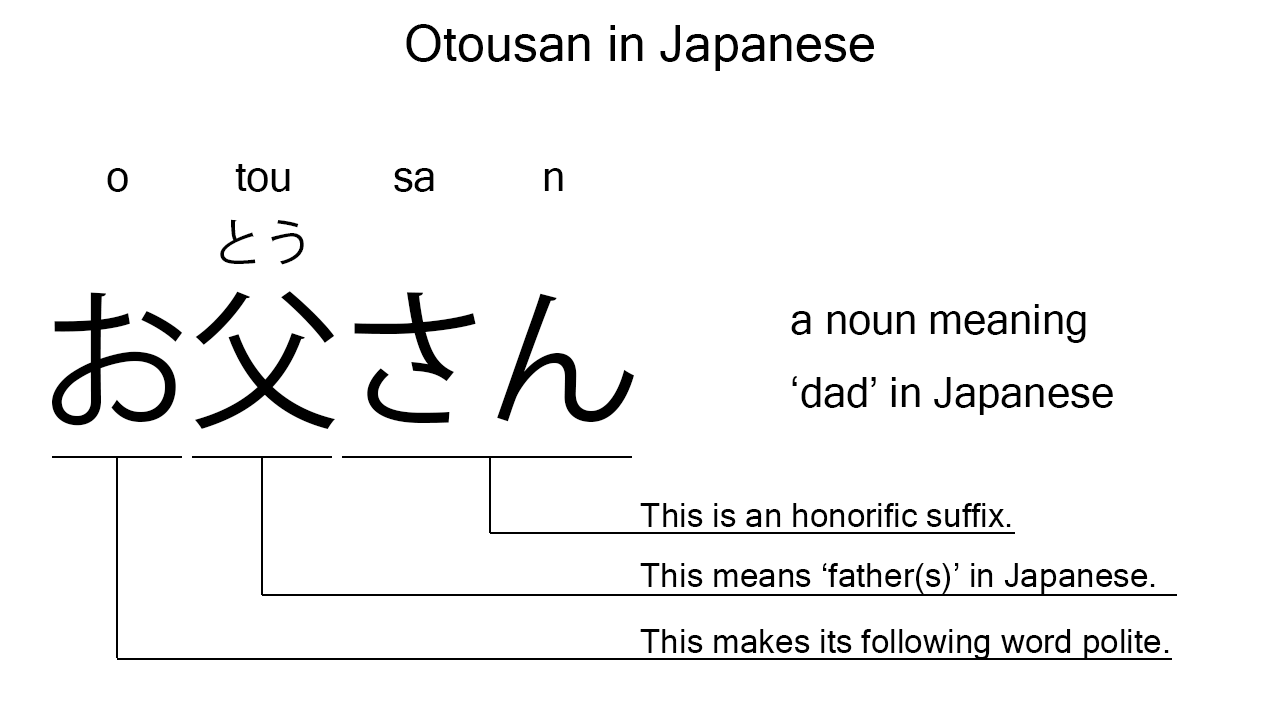What does “otousan” mean in Japanese?
Native speakers use otousan often to mean a ‘dad’ in Japanese. Perhaps, some Japanese learners know this word as it is sometimes used in Japanese conversations. In this blog post, however, I’m explaining this word in detail based on its kanji-mixed expression. And also, I’m explaining how to use it through example sentences. My explanations would help Japanese learners understand otousan more clearly. Then, let’s get started!
Contents
Definition and meanings of “otousan”
Let me start with the definition and meanings of otousan.
- otousan – お父さん (おとうさん) : a noun meaning a ‘dad’ or ‘father’ in Japanese. This can also work as plural. Learn more about Japanese plural.
Normally, this noun is used by a child to call his/her father. So, the usage is very similar to that of the English noun, dad, I think.
The definition and meanings are simple and clear. To understand this noun more clearly, however, let me explain its kanji-mixed expression in detail.
Otousan in kanji
The kanji-mixed expression of otousan consists of the following three components:
- o – お : a prefix making its following word polite.
- tou – 父 (とう) : a noun which can mean a ‘father’ in Japanese.
- san – さん : an honorific suffix often used after a name to make it sound polite.
From these three components, we can understand that otousan is literally the polite expression for a father in Japanese. And actually, it is. In Japan, children call their fathers with showing their respect. It’s also worth mentioning here that this noun is not suitable for formal situations. Japanese people often try to be polite by lowering their positions. In formal situations, therefore, they often call their fathers in a less polite way: they do not want to respect their fathers more than the listeners in conversations.

When we meet new kanji-mixed expressions, we should check their components in detail to understand their meanings clearly and deeply. In many cases, components tell us a lot about the meanings of the expressions they form. Actually, here, we could get the better understanding of otousan through the detailed check above.
So far, I’ve explained the definition and meanings of otousan together with its components. Then, let me explain how to use it through the example sentences below.
How to say “dad” in Japanese
watashi wa otousan ga suki desu – 私はお父さんが好きです (わたしはおとうさんがすきです)
I love my dad.
Below are the new words used in the example sentence.
- watashi – 私 (わたし) : a pronoun meaning ‘I’ in Japanese.
- wa – は : a binding particle working as a case marker or topic marker. In the example, this works after watashi to make the subject in the sentence.
- ga – が : a case particle used to make the subject word or the object word in a sentence. In the example, this is used after otousan to make the object in the sentence.
- suki – 好き (すき) : the stem part of the na-adjective, sukina, which means ‘favorite’ in Japanese. Native speakers, however, often use this as an individual word to mean ‘to like’ or ‘to love’ in Japanese. In the example, this is used to mean ‘to love’ in Japanese.
- desu – です : an auxiliary verb used after a noun or adjective to make it polite. Probably, this is well known as a part of the Japanese desu form. In the example, this is used after suki to make it sound polite.
This is a typical usage of otousan. Again, but it is often used by a child to call his/her father. So, the usage is very similar to that of dad in English.
Another example of “otousan”
kodomo wa otousan yori okaasan ga suki desu – 子供はお父さんよりお母さんが好きです (こどもはおとうさんよりおかあさんがすきです)
Children love their moms more than their dads.
Below are the new words used in the example sentence.
- kodomo – 子供 (こども) : a noun meaning a ‘child’ or ‘kid’ in Japanese. This can also work as plural.
- yori – より : a case particle working as a comparison marker. In the example, this works after otousan to provide the target of the comparison with okaasan. Word orders in Japanese and English are different, but the role of this case particle is similar to that of than in English.
- okaasan – お母さん (おかあさん) : a noun meaning a ‘mom’ in Japanese. This can also work as plural.
This is another example of otousan. In this example, it works as a plural to mean ‘dads’ in Japanese. When we want to mean a ‘dad’ or ‘dads’ in Japanese, this noun is a very good option.
Summary
In this blog post, I’ve explained the definition and meanings of otousan in detail based on its kanji-mixed expression. And also, I’ve explained how to use it through the example sentences. Let me summarize them as follows.
- otousan – お父さん (おとうさん) : a noun meaning a ‘dad’ or ‘father’ in Japanese. This can also work as plural. Normally, this noun is used by a child to call his/her father. So, the usage is very similar to that of the English noun, dad, I think. Grammatically, this is the polite expression for a father in Japanese. And actually, it is. In Japan, children call their fathers with showing their respect. It’s also worth mentioning here that this noun is not suitable for formal situations. Japanese people often try to be polite by lowering their positions. In formal situations, therefore, they often call their fathers in a less polite way: they do not want to respect their fathers more than the listeners in conversations.
Hope my explanations are understandable and helpful for Japanese learners.
Leave a Reply